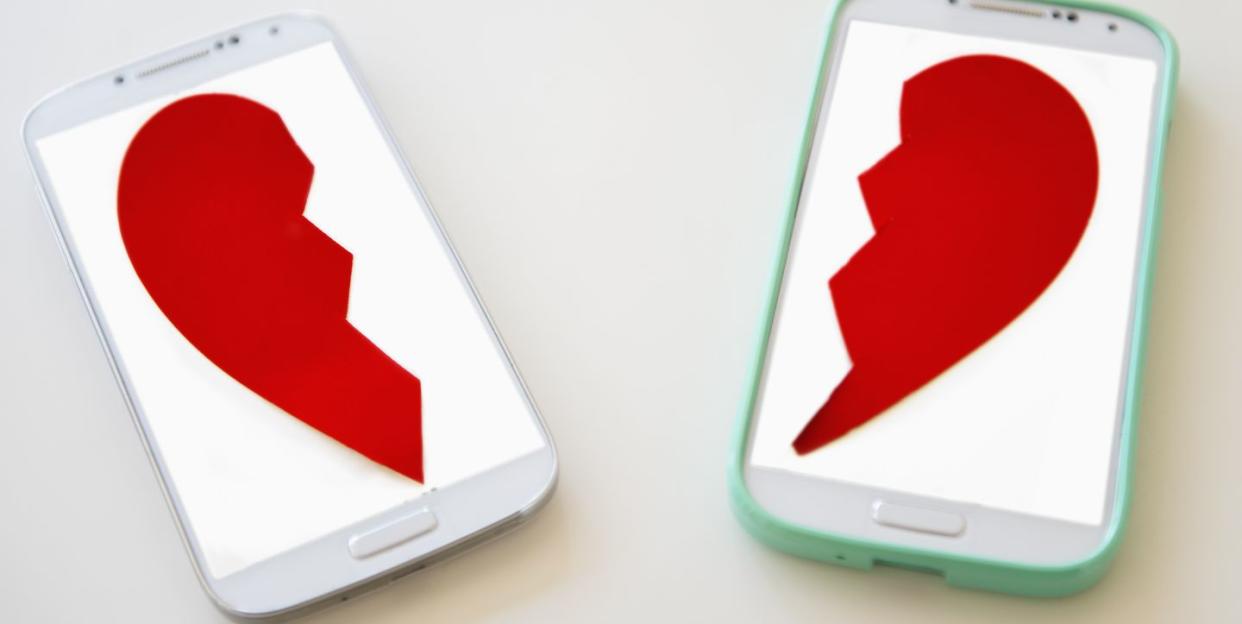Uh, If You're Reading This When You're Next To Your Partner, Trouble Lies Ahead

Okay, so picture this: You're snugged up on the couch with your other half, but instead of watching the thriller you both picked out, you’re scrolling Insta (or, ahem, reading this story). That’s phubbing.
You’re out for sushi and your date has their phone on the table, and they’re distracted by the dings of incoming texts. That’s phubbing.
You’re at a bar with your bae and aren’t talking because you’re both tweeting. That’s double phubbing. (I made that last one up, but you get the idea.)
Phubbing stands for “phone snubbing,” explains Meredith E. David, PhD, assistant professor of marketing at Baylor University. “It happens when you’re ignoring the person you’re with because you’re distracted by your phone,” she says.
Nonverbal cues (body language) say a lot. A fave celeb couple's, decoded:
And get this, you’re phubbing whether you’re staring at your screen for a long period of time or just glancing at it for a moment. (Oopsie.)
While you can phub anyone-a friend, a boss, your kid-you're probably (definitely?) guilty of it with your S.O. Research found that the majority of coupled-up women said that their devices got in the middle of their time with their partner, a term the researchers dubbed "technoference."
Phubbing sounds like a harmless offense, but is it really? Here's why you really need to put down the phone (after this article, of course)-and exactly how to do so.
The Problems
1. Phubbing makes you and your partner feel lousy.
Eye contact and keen listening tell your partner that you care about their thoughts and feelings, right? Well, it makes sense then that by looking at your phone, you're telling them the opposite. (Yes, even if what your doing is posting an IG story about all the fun you two are having mini-golfing right now.)
"Phubbing someone makes them start to feel a bit insecure and excluded," says David. "We start to wonder what’s on the phone that’s a greater priority."
Her 2017 study (hilariously called “Phubbed and Alone”) found that being phubbed made people feel needy for attention. And that's never a good thing.
2. Phubbing creates a cyclical effect.
In David's study, the people who were phubbed did an interesting thing: Instead of finding someone else to talk to, in an attempt to shake off the loneliness, they hopped on their phones as well.
More specifically, they turned to social media in a bid to feel included in something again. “It becomes a nasty cycle,” says David. “Your face-to-face interactions aren’t satisfying because of phubbing, and turning to social media does nothing positive for the relationship."
3. Phubbing actually effs with your overall happiness.
Another one of David’s studies, published in the journal Computers in Human Behavior in 2016, found that phubbing your S.O. crushed your relationship so much that it ultimately decreased life satisfaction. The bad habit was even named a potential contributor to depression.
At the very least, the study (titled "My life is a major distraction from my cell phone"-LOL) found that phubbing made the chances of a fight much more likely.
4. Phubbing is way worse for certain people.
How big of an issue this becomes in your relationship depends on whether you or your partner has an anxious attachment style. Basically: how secure do you feel in relationships?
Someone on the anxious end of the spectrum is more likely to fret about being abandoned, or just have trust issues in general. But phubbing amplifies this.
“We found that phubbing makes these people feel really rejected and turns them off to other face-to-face interactions," says David. "It also has the downstream effect of negatively affecting their wellbeing."
Not only does phubbing send the message that your priorities and interests lie elsewhere, but you’re also conveying that you're A-okay with losing an opportunity to get closer and connect in some way.
The Solutions
1. Own up to your phubbing.
Nothing kills the mood like saying "huh" when your partner asks you about your day when you’re sitting right across from them. Sounds all too familiar, right? Don't beat yourself up about it-remember, most people are guilty of phubbing.
But do acknowledge the habit is an issue for you, and make amends to fix it.
2. Stash your phone away.
When you go out, especially if it’s dinner at a restaurant or another intimate setting, keep your phone completely out of sight, says David. Having your phone around tells your partner that as soon as it vibrates, that device has priority over them.
Should you be expecting an important call and need to have your phone on the table, then openly fess up to it, she suggests. The idea is to send the message that the person you're with is your number one, and no one else (definitely not the influencer you’ve never even met).
And if you do keep your phone out, make sure you only reach for it if and when that important call comes through-otherwise, you're adding a whole 'nother issue to the mix (lying!).
3. Stop the phubbing cycle.
Remember David’s research that revealed that, when phubbed, people's first instinct is to pick up their phones too? Do what you can to fight that urge.
“We have to realize that sometimes, being phubbed is inevitable, so try not to take it too personally," says David, noting that many times, it's not intentional.
Instead of filling the time scrolling (which might only encourage your partner to stay on their phone), make good use of those minutes: Take a moment to look around you and notice something.
Is it a beautiful day out? Did the barista give you the perfect cream-to-coffee ratio? Reflect on something positive-like how *freeing* it feels to untie yourself from a perpetual distraction.
('You Might Also Like',)

